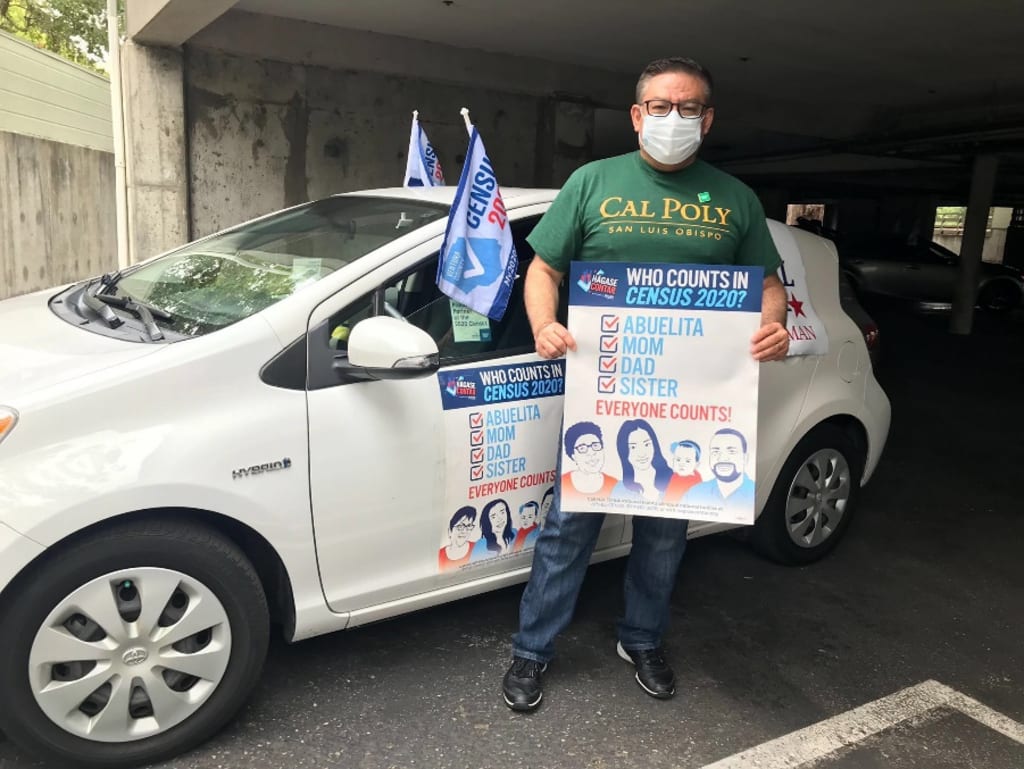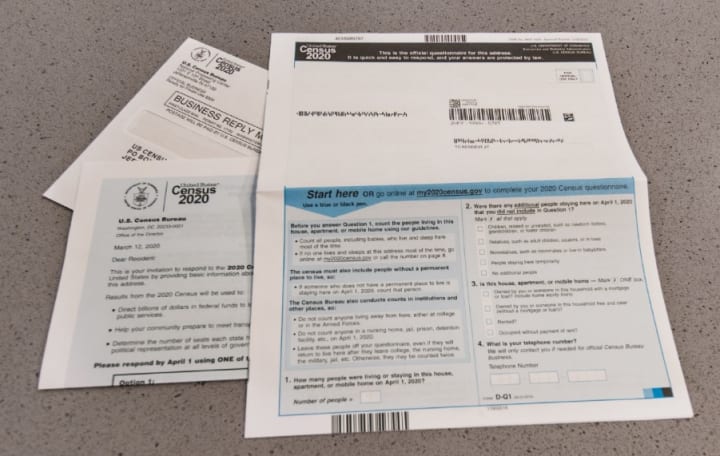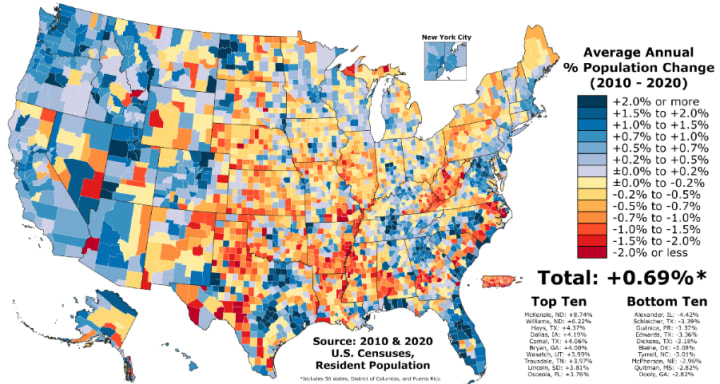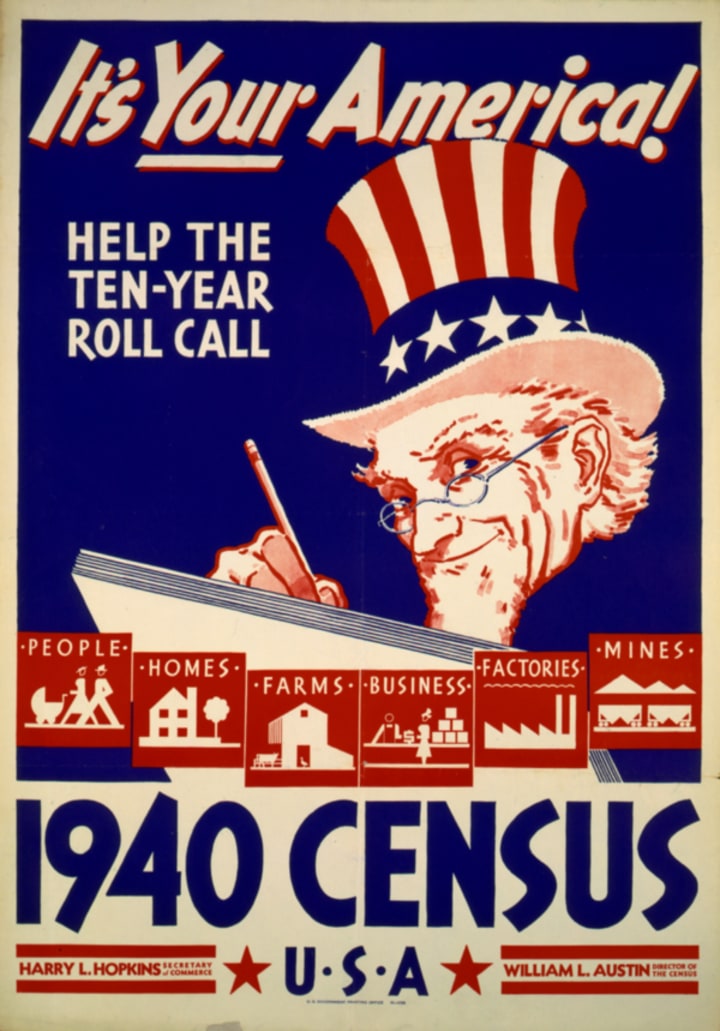
» KEY POINTS
- Many locations have appealed the results of the 2020 Census because they believe there was an undercount in their communities.
- Based upon my own experience employed by the Census Bureau, I can understand their fears, and the decade of consequences to follow.
- While the Census was ongoing, I wrote a piece of fiction to help explain the situation that may add valuable insight to the cases of these municipalities.

[P]risons... became among the most difficult places to count—along with college dorms, nursing homes and military barracks—as the coronavirus spread throughout the U.S. during crucial weeks for the [C]ensus in the spring of 2020. Students were sent home from campuses, and prisons and nursing homes went into lockdowns when those residents were supposed to be counted.
From “‘Whoa, that’s not right’: Georgia towns lead census appeals” by Mike Schneider of the Associated Press on January 22, 2022.
Several fights were going on simultaneously related to the results of the 2020 Decennial Census. However, what they all came down to was a question of undercounts in specific locations. Not having your population correctly counted—especially in relation to minority groups—would lead to fewer representatives in Congress, local legislative bodies, and the Electoral College; less funding from Federal, State and County governments; more expenses at home due to still having to provide services to uncounted people; and many more such issues that would last a decade. As such, by early 2022, various municipalities had already launched appeals and lawsuits to fight the results distributed by the Census Bureau after a laborious “imputation” method to get the numbers as accurate as the agency deemed possible.

Their chances of getting a favorable ruling were not good. A similar process that had existed for appeals had not led to much, if any change. According to Hansi Lo Wang of NPR in his piece “Challenging census results could mean more federal money for your community”:
For the 2010 [C]ensus, the counts for about 1% of tribal, [S]tate and local governments were revised… and ultimately... 175 housing units and 527 people [were added] nationwide.
I had a great amount of sympathy for all of these places, and shared their concerns. Having read about their accounts, watched fights over gerrymandered districts, and thought about how the next 10 years would look, I was reminded about my own experiences working as an Enumerator (see below for a definition) during the 2020 Census and the tribulation and failures it entailed. That, in turn, prompted me to recall something I had put together back then; a little capture-in-time that may have had some value to the cases of these localities.
For full disclosure, not only did I contribute to the 2020 Census, but I continue to do occasional work for the Census Bureau and the Department of Commerce, including at the time of this writing as a Quality Control Field Representative for the “Final Housing Unit Follow-Up”. Post publication, I may take on additional temporary assignments as conditions and time permit.
» BACKGROUND
Working in the field for the United States Census Bureau is a lonely job. Although your tasks consist of talking to people, most of the time they are not home or do not answer their doors and phones. More so, while your co-workers are out there, you rarely see them, so there is no sense of community or belonging. Supervisors are equally—if not even more—elusive. You truly do feel like you are alone in the world with no support at all.
Thankfully in the 21st century we have many methods and tools for meeting others in the same boat and can commiserate about our experiences. One such place was on the Census sub-Reddit, a message board that my fellow Census workers and I flocked to. It provided the necessary sustenance and direction we were not getting from all of the many layers above us. While swapping tales of horror and wonder, I was inspired to write a short play to capture a particular experience I and several other people were going through.

It is important to note that people who work for the Census Bureau sign a lifetime obligation to never reveal any identifying data or information related to their collection and analysis activities. Any disclosure is punishable by up to five years in jail and a maximum of $250,000 in fines.
Because of this, it is imperative to be clear that this is a work of fiction. While based on true events; names, places, situations, number of people involved, and any other relevant details have been obfuscated, combined, or completely made up. This piece is a parody and should not be considered any type of official or unofficial release from the Census Bureau, Department of Commerce, or the United States government in general, nor should this be constituted as any type of whistleblower report.
And as I told one of the original readers who did not quite “get it”:
[E]njoy a little artistic license without all of the real details and massive minutiae of every discussion with all the various people within the college administration, or the fact that "Enumerator" and "CFM" are actually multiple different people.
» CHARACTERS AND TERMINOLOGY
Enumerator: A person who works intermittently for the Census Bureau during the Decennial (every 10 years) Census. The Enumerator’s job is to go door-to-door and get headcount and biographical data from people who have not self-responded to the Census through online, mail, local community drives, phone, or other methods. The Enumerator has no control of their assignments and may be given the same location several days in a row or have an entire apartment building split up between several Enumerators, thus upsetting everyone with multiple visits.
CFS: Short for “Census Field Supervisor”, the Enumerator reports directly to the CFS. In turn, the CFS manages a team of roughly 15-20 different Enumerators over a physical area, often one or many “Census Blocks”, or ways the Census Bureau has sliced up the country that does not align to any other method, such as districts for the House of Representatives. The CFS has as little training as the Enumerator and almost no power. The CFS may also do some field Enumerator work, too, but is more likely to just be an intermediary from the upper-echelons of the organization.
CFM: Short for “Census Field Manager”, the CFM is above the CFS in the hierarchy. The CFM is also as poorly trained as the CFS and the Enumerator, but does have the power to override the work both do. Since the CFM has no field training or experience, directives given are often nonsensical and unhelpful. Typically they are one word or short phrase responses in the system that could be summed up as “Just figure it out yourself and do it”, despite whatever the situation may be.
FDC: Short for “Field Data Capture”, FDC is a custom app for the iPhone that is used by the Enumerator to record data from respondents. Further, FDC is the main communication method for Enumerators and their CFS and CFM through the note taking system in order to provide relevant details and background. FDC is incredibly unwieldy, specific, and does not allow basic functions like copy and paste. That means that a family of 15 requires manually putting in their 27-character all-consonant name for each person individually.
Person 1: A typical respondent at the address the Enumerator has been assigned to. Although it is in the middle of the COVID-19 Pandemic (before vaccines even exist) and people have been told to maintain social distance, Person 1 is still willing to answer the door to an unexpected stranger, although will never wear a mask or stay in their own personal space.
Guard: A person who works at a Group Quarters location—a place where multiple people live under the management of another organization like a prison, nursing home, or university. This is not to be confused with a multi-unit dwelling like an apartment building or condo complex. The Guard here patrols the grounds of one such place.
Phone Proxy: A proxy in general is someone who stands in and answers questions for another respondent. For instance, if someone is not home at Apartment #1, the Enumerator is told by FDC to find three other potential proxies to answer the questions for Apartment #1. This might be going to Apartments #2, #3, and #4, or perhaps talking to the management of the building or even some random person in the hallway. Although it is not standard procedure or part of training, the Enumerator may find valid phone numbers and call people up to get a response. Sometimes, it makes sense to call the manager of a unit, hence the Phone Proxy.
In-Movers: People who moved into a unit after April 1, 2020. The Census records the people who were living there on that date, so the people who have come in since then are In-Movers and do not count there, but instead must be counted where they were on April 1, 2020.
NOV: Short for “Notice of Visit”, a NOV is a standard form that the Enumerator leaves at a location when no one answers. The NOV contains directions for responding to the Census, as well as a unique code for that specific location. NOVs must be placed somewhere that can be seen (though not easily from the street by someone just passing by), but Enumerators are not allowed to put them in mailboxes or open screen doors to put them in there.
Breathable Air: Because the 2020 Census was delayed from “April through June” to “July through October”, the weather outside is much worse. This includes massive heatwaves, forest fires, hurricanes, and other natural and man-made disasters. Having a good day with breathable air, calm weather, and no other major issues is a rare treat and must be savored.

» ACT 1
SCENE 1
Outside a set of row-style houses that are covered in signs for LoCal College
Enumerator: <Enters from stage right, walks over to door and knocks> OK, here we go!
Person 1: <Opens door without wearing a mask and peers out> Yaa?
Enumerator: Hello, I'm from the United States Census Bureau. Is this 1 Obviously College Dorm Way, Unit 1 of 300?
Person 1: Ummmm... I dunno.
Enumerator: You... don't... know?
Person 1: I just moved in.
Enumerator: Oh, well, do you know anything about the people who lived here on April 1st?
Person 1: I dunno, the college just assigned me here.
Enumerator: Oh, so this is a dorm?
Person 1: I dunno.
Enumerator: OK, thanks for your time.
Person 1: <Shuts door>
Enumerator: What do you think, FDC?
FDC: Get me a proxy!
Enumerator: Everyone I talk to says the same thing, FDC. I think this might be a Group Quarters.
FDC: I don't believe you!
Enumerator: All right, for now, I’ll just mark everyone as In-Movers, leave NOVs, put my concerns in the notes, and let my CFS know. I'm sure our caring and careful data-driven organization will know what to do with such detailed and well-crafted notes!
SCENE 2
3 days later outside same location
Enumerator: Hmmmm... I seem to be back here again. This is going to end up with the same issue. Oh look, there's someone who can help!
Guard: <Walks towards Enumerator but does not maintain social distance> What are you doing prowling around this obvious college dorm when you are obviously not a student?
Enumerator: I'm with the United States Census Bureau and signs warding people off do not apply to me*. But that's beside the point! Can you tell me about this place?
[ * By law, signs like “No Trespassing”, “No Solicitation”, or the like do not apply to Field Representatives of the Census Bureau. They are allowed to and required to enter any property, short of opening a door and entering a dwelling. ]
Guard: It's a dorm. Lots of students live here.
Enumerator: What about on April 1st?
Guard: Same thing.
Enumerator: All right, we'll give this a try.
Guard: <Exits, but continues to glare from the edge of the curtain>
Enumerator: FDC, I now have confirmation that this is Group Quarters from a Proxy, and you are going to accept it.
FDC: All right, but you are going to record that statement individually 300 times.
Enumerator: Oh FDC, you are such a kidder!
FDC: <Stares back>
Enumerator: Oh... I see...
SCENE 3
The Evil Headquarters of CFM Central, deep underground
CFM: Oh, let's see what our hard-working Enumerators have for us today. <Ruffles some papers> GROUP QUARTERS?! WHY I NEVER! FDC?
FDC: Yes boss?
CFM: Although I have never left this underground layer, I obviously know more about how the world works than any puny Enumerator. Unmark this as Group Quarters and take a memo.
FDC: Ready boss! Everything you say is like ambrosia from the gods!
CFM: Enumerator, just because college students live here, does not mean this is Group Quarters. Get back in there, gain access by any means possible, and E-N-U-M-E-R-A-T-E.
» ACT 2
SCENE 1
Enumerator's dining room table, where all pandemic home offices are
Enumerator: OK, FDC, what do you have for me today?
FDC: You are going back to 1 Obviously a College Dorm Way.
Enumerator: What, why?
FDC: Here's a note from CFM. <Hands over note>
Enumerator: This can't be! No, I have a better idea.
FDC: You aren't allowed to do that.
Enumerator: Hold on. <Enumerator starts scrolling through the computer screen and picks up a phone> I've got a solution to this. <Dials phone>
Phone Proxy: Hello, this is the Office of Student Housing for LoCal College. How may I help you?
Enumerator: Hi, I'm an Enumerator for the United States Census Bureau.
Phone Proxy: Oh good, I love to help people like you!
Enumerator: Fantastic! Can you tell me about 1 Obviously College Dorm Way?
Phone Proxy: Of course, those are all our student housing.
Enumerator: Was it always student housing? What about on April 1st?
Phone Proxy: Of course! We don't own the buildings, though, we just lease them.
Enumerator: Ah, I see the problem then. And you were leasing them last year?
Phone Proxy: We've leased them for a decade. Our students are the only people who have ever lived there!
Enumerator: Did you include the students who live there in the count you provided to the Census Bureau?
Phone Proxy: Yes, of course. We are actually civically responsible and do everything we are supposed to, double checking all our data so as to not have any issues and make your life much easier.
Enumerator: Well thank you very much, I'll let you go!
Phone Proxy: You are very welcome! Be sure to reach out to me if you have any questions or issues and tell your boss to do the same. I am always happy to help! <Exits>
Enumerator: You heard it yourself FDC, we now have super confirmation that these are all Group Quarters!
FDC: You know what to do.
Enumerator: 300 times?
FDC: 300 times.
SCENE 2
1 Week later, outside a different building
Enumerator: FDC, I'm feeling great! The weather is actually nice, the air is breathable, and I've been assigned to a location I haven't personally proxied a dozen times myself*. What could go wrong?
[ * As it gets later into the timeline, most of the remaining cases are for non-respondents that require a proxy. Enumerators are often sent back to the same location day-after-day and told to find proxies. ]
FDC: Incoming message from CFM.
Enumerator: Huh?
FDC: You now have to enumerate 1 Obviously College Dorm Way.
Enumerator: But I checked my entire list! It was not on there! And I've already resolved this situation. What happened?
CFM: <Walks on stage surrounded by smoke to signify a flashback> I won't read any of these notes; I'll just say these aren't Group Quarters again and tell them to PROXY HARDER! That will resolve this situation for sure! <Exits into the smoke>
Enumerator: No, absolutely not! FDC, get me CFS.
CFS: <Enters> Yo, whazzzup?
Enumerator: CFS, look at this situation. There is nothing we could possibly count! You have to stop sending me and the other Enumerators here!
CFS: Well, like, you know, and stuff.
Enumerator: Ummmmm... no?
CFS: Like, it's... umm... a building. And LoCal College, it... uh... ummm... doesn't, like, own it.
Enumerator: They don't have to own it for it to be a Group Quarters.
CFS: Can you, like, ummm... go ask that guy you called for the... ummmm... population count thing for it. Then, like, you can, like, ummm... trust, that it will be, like, fixed later.
Enumerator: No, that would literally be a double count! That goes against everything you ever taught me.
CFS: Oh, like, hadn't thought about, ummm... that. Let me, like, ask CFM what to do.
Enumerator: OK, so while you do that, I'm going to mark this all back to Group Quarters.
FDC: 300 times!
Enumerator: 300... times...
» ACT 3
This play isn't over yet! What do you think will happen next? Write your last act and we'll see over the coming weeks which one is closest to reality. The winner receives a shiny piece of Enumerator Pride (No Cash Value)!
» FOLLOW-UP
While no one wrote a final act of their own, there were a lot of great responses from fellow Enumerators who had either gone through a similar experience or were extremely sympathetic. Aside from that one person mentioned in the introduction, everyone seemed to enjoy the joke. Here are a few choice responses:
I got to the end and am just glad to finally have confirmation that enumerator pride has no value.
This is the most accurate portrayal of a CFM yet. 10/10
Whoever is in charge of the [postmortem] for this operation needs to come and make a case study out of this subreddit.

The above piece is an excerpt from Always Divided, Never United: And Other Stories During a Time of Pandemics and Politics by J.P. Prag, available at booksellers worldwide.

Learn more about author J.P. Prag at www.jpprag.com.

An earlier version of this article appeared on Medium.
About the Creator
J.P. Prag
J.P. Prag is the author of "Aestas ¤ The Yellow Balloon", "Compendium of Humanity's End", "254 Days to Impeachment", "Always Divided, Never United", "New & Improved: The United States of America", and more! Learn more at www.jpprag.com.






Comments
There are no comments for this story
Be the first to respond and start the conversation.